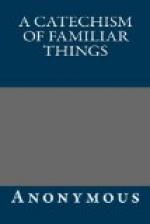Upon what materials did the ancients paint their works?
Principally upon wood; the boards or tables were prepared with a thin ground of chalk and size of some kind. Linen cloth or canvas was also employed, but there is no evidence of its use before the reign of Nero. Parchment, ivory and plaster were the other materials.
Evidence, testimony, record.
Who was Nero?
One of the Roman Emperors, a monster of cruelty, extravagance, and debauchery; he raised a dreadful persecution against the Christians, in which St. Paul was beheaded, and St. Peter crucified. At last, being deserted by his army and the senate, he destroyed himself, after a reign of fourteen years.
Debauchery, wickedness.
What is Poetry?
The glowing language of impassioned feeling, generally found in measured lines, and often in rhyme. Most ancient people had their poets.
Glowing, warm, energetic.
Impassioned, full of passion, animated.
Rhyme, the correspondence
of the last sound of one verse
to the last sound or
syllable of another.
Name a few of the ancient poets.
David was an inspired poet of the Hebrews: Homer, one of the earliest poets of the Greeks: Ossian, an ancient poet of the Scots: Taliesen, an ancient poet of the Welsh: and Odin, an early poet of the Scandinavians.
Who were the Scandinavians?
The inhabitants of Scandinavia, the ancient name of Denmark, Sweden, and Norway.
What people are regarded as the Fathers of Poetry?
The Greeks. Homer was the first and the prince of poets; he celebrated the siege of Troy in the Iliad and Odyssey, two epic poems which have never been surpassed. In the same kind of composition he was followed, nine hundred years after, by Virgil, in the Eneid; by Tasso, after another fifteen hundred years, in the ‘Jerusalem Delivered.’ The Greeks also boasted of their Pindar and Anacreon in lyric poetry; and of Aristophanes, Euripides, Sophocles, and Eschylus, in dramatic poetry.
Did the Romans possess any distinguished Poets?
Yes; among the epic poets were Ovid and Tibullus; among dramatists, Plautus and Terence; of didactic and philosophic poets, Lucretius, Virgil, Horace, and Silius Italicus. All these were so many miracles of human genius; and their works afford the models of their respective species of composition. Most of the works of the ancients have in sentiment, if not in spirit, been translated into English.
Miracles, wonders.
Genius, natural talent.
Respective, particular.
Sentiment, thought, meaning.
Did not the same revolution which undermined the Greek and Roman empires, and destroyed learning, the arts and sciences, and the taste for elegance and luxury, also prove fatal to Poetry?




